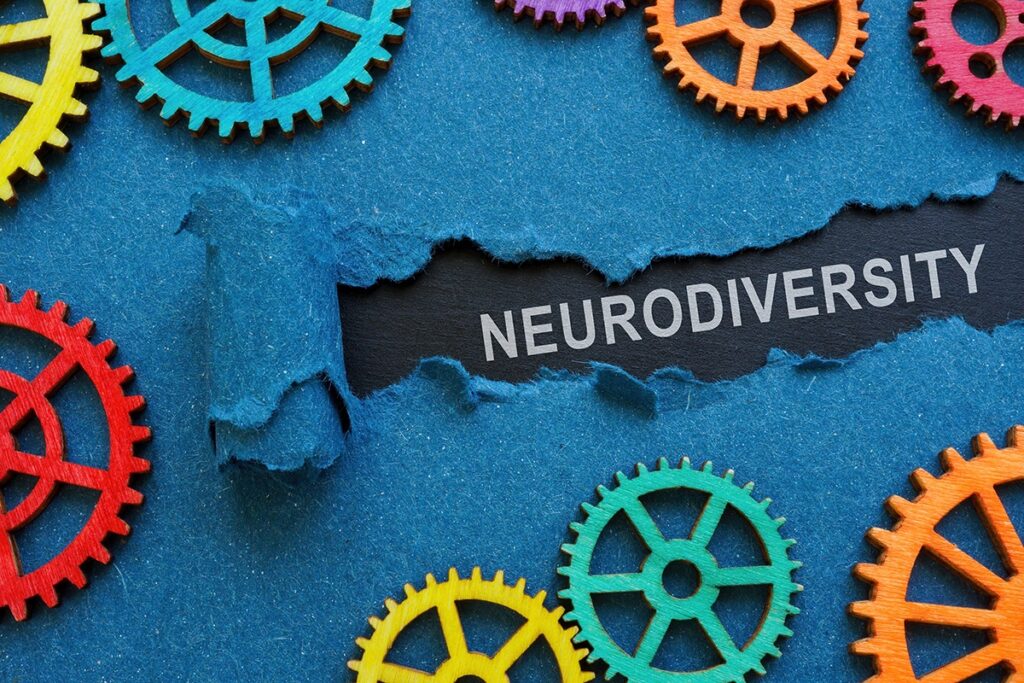
Both neurodiversity and mental health awareness are increasingly being discussed in medical conversations, something that’s a welcome shift compared to prior decades. However, in these discussions, there’s an important distinction to make between neurodiversity and general mental health issues (although the two topics can still often become intertwined).
With increased awareness around neurodiversity and mental health, it’s worth exploring how these can be linked, how the healthcare system can continue to better understand the connection, and how care can consistently be improved for those who need it.
Definition and Overview of Neurodiversity
Before diving into how neurodiversity is dealt with in the behavioral health system, it’s important to define what it actually is and how it presents.
Neurodivergent development simply means that a person’s brain works differently than how it’s typically expected to; however, this doesn’t mean their brain works incorrectly. On the flipside, neurotypical people are those whose brains work in the way they’re traditionally expected to. They aren’t affected by developmental disorders or similar conditions, like autism spectrum disorder. For neurodivergent individuals, behavior may be different from what’s usually defined as “normal,” with this being seen in various circumstances (depending on the type of neurodivergence at play).
These may include:
- Neurodevelopmental differences
- Differences in neurocognitive functions
- Neurological differences
Neurodivergent people also may see the world differently than their neurotypical counterparts. These differences in perception may be first noticed during their school years, with neurodivergent people sometimes requiring different learning methods to succeed. Cognitive nuances can also be seen early on in other aspects of life (like social preferences).
However, the extent of all of these differences can vary depending on the person’s circumstances as well as the condition or disorders they might have. In many cases, these differences may lead to various struggles during the person’s life.
Neurodiversity In The Behavioral Health System
How is neurodiversity typically addressed in the behavioral health system? A few of the more notable and effective treatments include:
- Cognitive behavioral therapy
- Dialectic behavior therapy
- Experiential therapy
- Motivational interviewing
These all depend on the mental health conditions a person is diagnosed with, as well as whether there are any co-occurring disorders. The efficacy of each treatment may vary significantly depending on a person’s individual circumstances.
In the behavioral health system, care is typically set up to address each neurodivergent person’s own perspectives, behavioral characteristics, and any unique challenges they may face. By providing affirming care that is specific to the distinct traits of the disorder they’re diagnosed with, treatment is typically effective for the individual.
Placing an emphasis on mental health discussions, neurodiversity, and the expertise of trained professionals will undoubtedly further awareness and ensure assistance is even more accessible to those who need it.
Why Is It Important to Address Neurodiversity In The Behavioral Health System?
It’s important for neurodiversity to be championed in the behavioral health system, because those who are on the spectrum deserve to have every care option available to live happy, healthy, and successful lives. For neurodivergent individuals, it’s also critically important that they feel both represented in society and comfortable in seeking out these effective care options.
The National Cancer Institute estimates that between 15 and 20 percent of the global populace lives with a type of neurodivergence. This large figure also points to the importance of our healthcare system devoting even more resources to behavioral health advancements. But how does this play out specifically?
Addressing neurodiversity in the behavioral health system means the cognitive nuances these individuals are experiencing should continue to be researched and treated in both new and existing ways.
Despite the amazing progress that’s been made so far by the behavioral health system in understanding neurodiversity and the most effective ways to treat specific disorders, greater investment in this area may still be needed. With additional funding for research efforts and clinical trials, neurodivergent individuals will undoubtedly receive more personalized, accessible, and efficient options to help them treat their mental health disorders.
Currently, neurodivergent people can get the help they need to manage any conditions they’re experiencing with the help of a trained mental health specialist, therapies, and in certain cases, prescribed medications.
Get The Help You Need
More and more neurodivergent people are being diagnosed with mental health disorders, and in response, the behavioral health system is continuing to develop new cutting-edge ways to provide more targeted and effective care.
These individuals deserve a system that works for them and serves their needs, which is the primary reason for additional exploration in this field of study. With increased investment in behavioral health research, a sharpened focus on neurodiversity, and greater societal awareness, the care options available for neurodivergent people will be enhanced, ultimately leading to an improved quality of life.
If you’re neurodivergent and need help with a mental health condition, Alvarado Parkway Institute is here to help you. The mental health professionals at our El Cajon and San Diego outpatient programs are able to provide effective, affirmative care for a variety of spectrum-related disorders (such as autism).
Whether you need one-on-one sessions or group therapy, we’re equipped to help with your needs. For more information about what we can do for you, contact us today.